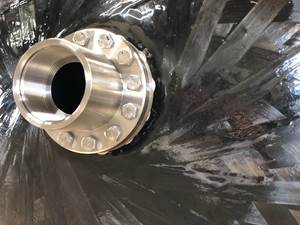Sereebo CFRTP sheets: "Saving the Earth"
Teijin’s carbon fiber/thermoplastic material, used in the CarbonPro pickup box, was developed with CO2 reduction in mind.
The trade name for Sereebo, Teijin Ltd.’s (Tokyo, Japan) carbon fiber-reinforced thermoplastic (CFRTP) sheets used in the manufacture of the CarbonPro pickup box, is an acronym for the English phrase “Save the Earth, REvolutionary & Evolutionary carBOn.” And company officials indicate that saving the earth was indeed a motivation for developing the material.
“Environmental concerns such as CO2 emission reductions and improvements in fuel efficiency are now global issues, so accelerated development of tough, lightweight eco-friendly composite components is a pressing task in the automotive industry,” explains Akio Nakaishi, Teijin Group corporate officer and Teijin Ltd. general manager of the composites business unit. He notes that carbon fiber-reinforced plastic (CFRP) already is widely used to reduce mass in many aerospace/aviation and industrial applications. However, thermoset-based CFRP composites are rarely used for products with high production volumes owing to their slow processing times and recycling challenges.
Nakaishi says that the company started accelerating its materials technology development efforts in 2008 when it launched the Teijin Composites Innovation Center for advanced composites research in Japan. From the start, automotive was said to be an important target market for the material, although the material will be appropriate for other markets and applications.
“To expand the use of CFRP for mass-produced industrial applications, in 2011 we developed the first technology for high-volume production of thermoplastic-formed CFRTP composites with a takt time of around 1 minute as the breakthrough to lead to increase use of high-performance, lightweight carbon fiber materials,” Nakaishi adds. He points out that selection of a thermoplastic resin alone didn’t guarantee success. “We developed intermediate materials suited for adoption in mass-production vehicles, new technologies for faster press-molding, as well as technologies for recycling — all of which are essential in promoting the use of CFRTP in high-volume, eco-friendly vehicles.”
As a materials supplier when the joint General Motors/Teijin development program began in 2011, Teijin focused on modeling techniques, extensive computer-aided engineering (CAE) work, and application and material validation testing to ensure Sereebo provided properties that met or exceeded GM’s expectations. The company also was involved in developing manufacturing strategies (including a processing method) for the material. Since Teijin’s acquisition of Continental Structural Plastics (CSP; Auburn Hills, Mich., U.S.) in 2017, its in-house expertise has expanded to cover the materials and manufacturing expertise needed to bring the composite to production readiness in line with GM’s start of production (SOP) date. “The project involved the dedication of significant resources to bring this best-in-class material to the market,” recalls Nakaishi.
Currently there are three major Sereebo product lines. The U Series features continuous, unidirectional carbon fiber in a sheet-form intermediate product with very high anisotropic strength in the machine direction. The I Series (used on the CarbonPro pickup box) features discontinuous/chopped fibers to offer a balance of moldability and isotropic properties in a sheet-form intermediate product. And the P Series features long fiber thermoplastic (LFT) pelletized products with high-strength carbon fiber for injection molded parts of high complexity that require higher performance than that of glass fiber alone. Nakaishi notes that this product is “…a promising material that will enable the recycling of CFRTP composites.”
The LFT version of Sereebo was first used in 2013 on commercial components for D5300 SLR cameras from Nikon Corp., Tokyo, Japan. The CarbonPro box not only is the automotive debut of the I Series Sereebo, but it also represents the world’s first commercial application for sheet-form Sereebo.
See CW’s June Focus on Design “Chopped carbon fiber, polyamide and innovation redefine the modern pickup truck” for more on Sereebo’s use in the CarbonPro pickup box.
Related Content
Carbon fiber, bionic design achieve peak performance in race-ready production vehicle
Porsche worked with Action Composites to design and manufacture an innovative carbon fiber safety cage option to lightweight one of its series race vehicles, built in a one-shot compression molding process.
Read MoreMcLaren celebrates 10 years of the McLaren P1 hybrid hypercar
Lightweight carbon fiber construction, Formula 1-inspired aerodynamics and high-performance hybrid powertrain technologies hallmark this hybrid vehicle, serve as a springboard for new race cars.
Read MoreInfinite Composites: Type V tanks for space, hydrogen, automotive and more
After a decade of proving its linerless, weight-saving composite tanks with NASA and more than 30 aerospace companies, this CryoSphere pioneer is scaling for growth in commercial space and sustainable transportation on Earth.
Read MoreComposites end markets: Automotive (2024)
Recent trends in automotive composites include new materials and developments for battery electric vehicles, hydrogen fuel cell technologies, and recycled and bio-based materials.
Read MoreRead Next
Developing bonded composite repair for ships, offshore units
Bureau Veritas and industry partners issue guidelines and pave the way for certification via StrengthBond Offshore project.
Read MoreVIDEO: High-volume processing for fiberglass components
Cannon Ergos, a company specializing in high-ton presses and equipment for composites fabrication and plastics processing, displayed automotive and industrial components at CAMX 2024.
Read MorePlant tour: Daher Shap’in TechCenter and composites production plant, Saint-Aignan-de-Grandlieu, France
Co-located R&D and production advance OOA thermosets, thermoplastics, welding, recycling and digital technologies for faster processing and certification of lighter, more sustainable composites.
Read More
.jpg;width=70;height=70;mode=crop)





















